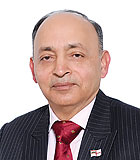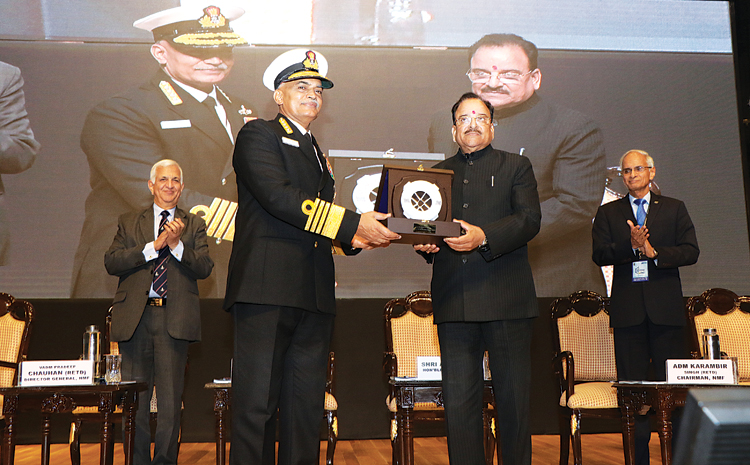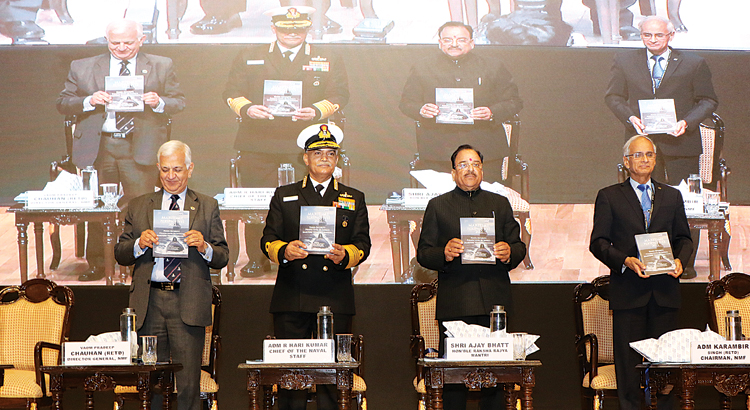INDIAN ARMED FORCES CHIEFS ON OUR RELENTLESS AND FOCUSED PUBLISHING EFFORTS

The insightful articles, inspiring narrations and analytical perspectives presented by the Editorial Team, establish an alluring connect with the reader. My compliments and best wishes to SP Guide Publications.

"Over the past 60 years, the growth of SP Guide Publications has mirrored the rising stature of Indian Navy. Its well-researched and informative magazines on Defence and Aerospace sector have served to shape an educated opinion of our military personnel, policy makers and the public alike. I wish SP's Publication team continued success, fair winds and following seas in all future endeavour!"

Since, its inception in 1964, SP Guide Publications has consistently demonstrated commitment to high-quality journalism in the aerospace and defence sectors, earning a well-deserved reputation as Asia's largest media house in this domain. I wish SP Guide Publications continued success in its pursuit of excellence.
- MoD initiates comprehensive review of Defence Acquisition Procedure 2020, pushes for defence reforms
- G7: The Swansong
- Kalinga Connect: South Asia to Polynesia
- Advanced MRSAM for India for a greater firepower
- Must Credit DRDO for Operation Sindoor, now what is next for defence R&D?
- Operation Sindoor | Day 2 DGMOs Briefing
- Operation Sindoor: Resolute yet Restrained
CONFERENCE REPORT / IPRD-2022
Operationalising the Indo-Pacific Oceans Initiative
The recently held Indo-Pacific Regional Dialogue – 2022 had globally renowned experts present a variety of multilateral and national perspectives on building maritime security cooperation that could best stitch the Indo-Pacific together
 | The Author was the Flag Officer Commanding-in-Chief, Southern Naval Command when he retired on November 30, 2021. He is a Navigation and Direction specialist. He was also the Director General Naval Operations and the Chief of Personnel, Indian Navy. |

The fourth edition of the Indo-Pacific Regional Dialogue (IPRD-2022) was held at New Delhi from November 23-25, 2022 by the Indian Navy, with the National Maritime Foundation (NMF) being the Chief organiser and knowledge partner, on the theme ‘Operationalising the Indo-Pacific Oceans Initiative’ (IPOI). The IPRD itself was conceived by the Indian Navy and the NMF in 2018 as a top-level international level conference to discuss maritime issues at the strategic level, and has been an annual event since then, with the exception of 2020, when it was postponed due to the Covid pandemic. The IPRD seeks to foster exchange of ideas and promote deliberations on maritime issues relevant to the Indo-Pacific, and is positioned as a Track 1.5 event that aims to encourage discussions on public policy, with representation from both government and non-government agencies and institutions. The IPRD-2022 witnessed participation by over 2,000 participants from India, friendly foreign countries and international organisations, which included: national and international dignitaries; diplomats; academics; eminent scholars; senior serving and retired officials from the Indian Armed Forces; representatives from the Ministries of Shipping, Environment, Forest and Climate Change; senior representatives from Indian industry; diplomatic representatives from missions in India; eminent citizens; and students from renowned universities in the NCR. The IPRD was addressed by globally renowned speakers and eminent panellists over the three days and saw a vibrant discussion due to active participation of the knowledgeable audience.
The concept of the IPOI was first suggested by Prime Minister of India Narendra Modi, at the 14th East Asia Summit (EAS) at Bangkok in November 2019, as a continuation of the SAGAR (Security and Growth for all in the Region) mission, enunciated by him in 2015. The main objective of the IPOI is to ensure the safety, security and stability of the maritime domain, and to achieve this, seven pillars have been enunciated, which include:
- Maritime Security (where India and the UK have taken the lead);
- Marine Ecology (with Australia in the lead);
- Science, Technology and Academic Cooperation;
- Disaster Risk Reduction and Management (with India in the lead);
- Capacity-building and Resource Sharing;
- Trade Connectivity and Maritime Transport (with Japan and India in the lead);
- and Maritime Resources (with Australia and Indonesia).
To operationalise the seven pillars mentioned under the IPOI, IPRD-2022 was conducted in six professional sessions:
- Weaving the Fabric of Holistic Maritime Security in the Indo-Pacific: Multilateral Options
- Constructing Holistic Security Bridges across the Western and Eastern Maritime Expanse of the Indo-Pacific
- Building Maritime Connectivity: Ports, Trade and Transport
- Capacity-building and Capability Enhancement: Leveraging the Physical and Social Sciences
- Practical Approaches to a Regional Blue Economy
- Disaster Risk Reduction and Management: Solution for SIDS and Vulnerable Littoral States.
In addition, there was an Inaugural Session and a ‘Margdarshan’ (Guidance) session which included addresses from Defence Minister Rajnath Singh, Minister of Environment Bhupendra Yadav, and the Minister of State for Defence Ajay Bhatt.
The inaugural session started with Admiral Karambir Singh (Retd), the Chairman of the NMF and former Chief of the Naval Staff, welcoming all present and highlighting the importance of the Indo-Pacific in the prevailing geopolitical scenario. He focussed especially SAGAR (Security and Growth for All in the Region) and the focus provided to SAGAR by the IPOI. In the Inaugural Address that followed, Admiral Hari Kumar, Chief of the Naval Staff, outlined the Indian Navy’s efforts to foster maritime cooperation in the Indo-Pacific. He brought out the challenges to India and other nations in the Indo-Pacific region, which included – domestic imperatives, external Influences and some ‘intrusive paradigms’, which would need collective approach by all stakeholders in the region to ensure a safe, secure and stable Indo-Pacific. He emphasised that the Indian Navy was fully invested in progressing each of the seven pillars of the IPOI.
Admiral Hari Kumar, Chief of the Naval Staff, reaffirmed the Indian Navy’s committed resolve in preserving the nation’s maritime interests adding that the IPRD was instrumental in evolving a shared approach towards regional maritime security
In his Keynote Address, the Minister of State for Defence Ajay Bhatt said that India is well prepared to address threats in the current and emerging maritime domain. He emphasised the need to build other aspects of India’s maritime capability, such as the merchant marine, ports, and the capability for sustainable management of the nation’s oceanic resources, in addition to bolstering military capabilities. He also laid particular stress upon rebuilding India’s maritime traditions and strengthening maritime orientation among the people of the country. He emphasised India’s deep commitment to inclusivity and international cooperation in every field of human endeavour. He also released a book titled, ‘Hard-Security Perspectives in India’s Maritime Neighbourhood’, published by the National Maritime Foundation. The inaugural session was followed by the first two thematic sessions on ‘Weaving the Fabric of Holistic Maritime Security in the Indo-Pacific: Multilateral Options’ and ‘Constructing Holistic-Security Bridges across the Western and Eastern Maritime Expanse of the Indo-Pacific’. In these sessions, globally renowned subject-matter experts presented a variety of multilateral and national perspectives on building maritime security cooperation that could best stitch the Indo-Pacific together.

The second day of the IPRD was conducted in three thematic sessions, which focused on three specific pillars of the IPOI namely, ‘Trade, Connectivity and Maritime Transport’, ‘Capacity Building and Resource Sharing’, and ‘Maritime Resources’. The first session of the day was based on the theme: ‘Building Maritime Connectivity: Ports, Trade and Transport’. The session included a special address by Dr Sanjeev Ranjan, Secretary to the Government of India, Ministry of Ports, Shipping and Waterways, who outlined India’s approach in building maritime connectivity. Perspectives from the ASEAN, Australia, India and Sri Lanka were also discussed during the session. The next session was conducted on the theme ‘Capacity-Building and Capability Enhancement: Leveraging the Physical and Social Sciences’, which commenced with a special address by Dr M. Ravichandran, Secretary, Ministry of Earth Sciences, Government of India. Dr Ravichandran emphasised that science and scientific research is a key element of the architecture of any ocean economy aspiring to be increasingly ‘Blue’, both at the national and regional level. He also laid stress upon the symbiotic relationship between the social and the physical sciences. The other speakers in the session presented views from the ASEAN, Israel, India, Japan and Chinese Taipei. The third session of the day began with a special address by Bhupender Yadav, Minister for Environment, Forest and Climate Change, who is also concurrently the Minister of Labour and Employment. After his address, the Minister released a book entitled ‘Transitioning from a ‘Brown’ to a ‘Blue’ Economy in the Face of Climate Change’, published by the NMF. This session, on the theme ‘Practical Approaches to a Regional Blue Economy (With Particular Focus on Ecologically-Sensitive Harvesting of Marine Resources)’, included speakers from Thailand, Kenya, France, Indonesia, and the United Nations Development Programme (UNDP).
The final day began with the ‘Margdarshan’ session. Admiral Hari Kumar, the Chief of the Naval Staff, stated that the IPRD represented the Samvad or ‘Dialogue’ aspect of the 5 S’s– Samman, Samvad, Sahyog, Shanti, and Samridhi – enunciated by the Prime Minister. He also reaffirmed the Indian Navy’s committed resolve in preserving the nation’s maritime interests adding that the IPRD was instrumental in evolving a shared approach towards regional maritime security. The Navy Chief said that the IPOI leveraged the uniting nature of the oceans through two key elements of ‘holistic approach’ and ‘inclusivity’. He also gave a succinct summation of the proceedings of the previous two days for the benefit of the Defence Minister.
Defence Minister Rajnath Singh, in his Keynote Address, said that the IPRD was a significant platform for exchange of ideas on enhancing cooperation in the Indo-Pacific. He reiterated India’s vision of a free, open and inclusive Indo-Pacific, and India’s faith in multilateralism and regionalism; and her principled commitment to rule of law. Stating that the ASEAN was central to the Indo-Pacific, he referred to two recent initiatives – the ‘India-ASEAN Initiative on Marine Plastic Pollution’ and the ‘India-ASEAN Initiative for Women in UN Peace Keeping Operations’. Invoking India’s rich maritime tradition and heritage, the Minister emphasised the importance of the oceans, for the growth and prosperity of India and other countries in the Indo-Pacific. Rajnath Singh said that in today’s deeply interconnected world, security was a collective enterprise. He exemplified India’s commitment to the vision of shared security and the Indian concept of Vasudhaiva Kutumbakam, by the key role played by the Indian Armed Forces, especially the Indian Navy, during the COVID-19 pandemic, in which they provided life-saving assistance to Indian Ocean countries through Op Samudra Setu and the Vaccine Maitri initiative. The Defence Minister emphasised that in today’s complex geopolitical environment, national security could not be considered a zero-sum game, and that a ‘multi-aligned policy’ was the only pragmatic solution to global security concerns. He also released a book, published by the NMF titled ‘Coastal Security Dimensions of Maritime Security’.

The second session of the final day was on the theme of ‘Disaster Risk-Reduction and Management: Solutions for Small Island Developing States (SIDS) and Vulnerable Littoral States’, which brought together perspectives from Bangladesh, France, India, Maldives, and the Coalition for Disaster Resilient Infrastructure (CDRI). The session highlighted the vulnerability of low-lying islands and littorals in the Indo-Pacific to the effects of climate change; the increase in incidences of natural disasters such as cyclones and droughts; and aspects related to disaster management and mitigation; especially the urgent need for devising collective and collaborative strategies to mitigate them.
The final session commenced with the Valedictory Address, in which Vice Admiral G. Ashok Kumar (Retd), the National Maritime Security Coordinator, touched upon issues impacting maritime security in the Indo-Pacific such as inter-agency coordination, the importance of information sharing in enhancing Maritime Domain Awareness and also certain challenges such as problems in enforcement of rules and maritime disputes. The valedictory address was followed by release of a book entitled ‘Public International Maritime Law’, published by the NMF. The IPRD 2022 culminated with the closing address by Vice Admiral S.N. Ghormade, the Vice Chief of the Naval Staff, in which he recounted the diverse tapestry of the Indo-Pacific comprising the political, social, economic, and military aspects that emerged during the vibrant three-day discussions. Vice Admiral Ghormade laid stress upon the need to leverage the rich diversity within the Indo-Pacific and be more imaginative in arriving at solutions to problems affecting the Indo-Pacific. He also summarised the key takeaways of the event, such as a wider interpretation and understanding of the Blue Economy, and the fact that there were several issues of concern, such as the lack of proper management and regulation of fish stocks, which if unaddressed, could potentially emerge as disasters in the future.
At the end of the IPRD-2022, one carried the impression of an intellectually vibrant and well-attended conference. The chosen theme, ‘Operationalising the IPOI’, was very apt, as it is easier to enunciate concepts such as SAGAR and IPOI, but much more difficult to implement them. The IPRD-2022 tackled this factor head-on, and the deliberations threw up many achievable ideas and targets, which will need to be followed up my members of the IPOI in the coming years. The fact that senior-level functionaries from concerned Government Departments attended the IPRD, along with the deep involvement of the Indian Navy, and finally the excellent organisation and conduct of an event of such magnitude by the NMF, left one with a sense of satisfaction that the IPRD is poised to become a major international conference in the Indo-Pacific region in the years ahead.





